
by Fiona Biedermann (Australia) | Apr 28, 2014 | Awareness, Child Care, Childhood, Family, Health, Human Rights, Life Lesson, Loss of Child, Oceania, Parenting, Relationships, Safety, Tragedy, Uncategorized, World Motherhood, Younger Children
As parents I’ve always believed that all of us want our children to achieve their full potential and to do amazing things with their lives, we also never want for them to be fearful of anything, real or imagined.
But what happens when a child’s fear is not imagined and is in fact very real. When the one thing they’re most fearful of is the person who they should be able to trust the most?
A story in the news this week in Adelaide has parents—actually not just parents but every living, breathing individual—up in arms over the treatment of a four-year-old little girl in 2012, who died as a result of the cruel treatment dished out by her mother and her boyfriend.
As the story is told, they put this little girl on a 50kg motorbike and over a period of three days made her ride it around the backyard while they videotaped it for their own enjoyment. Despite her terror and numerous crashes, they kept picking her up and putting her back on.
A final crash into a tree at almost 40km/h caused serious injury and despite complaining of her injuries when they put her to bed they did nothing. The following day she slipped into unconsciousness and they waited a further eight hours before seeking help, turning instead to Google for answers about what to do when someone is unconscious. She died as a result of them not seeking medical assistance.
There are many more facts, there’s much more to the story and there’s also a history of social welfare intervention—but nobody actually stepped in and took this child away from her mother, nobody in fact did anything to save her despite their knowledge that things weren’t quite right.
This week, the mother and her boyfriend were both sentenced, with the mother receiving an eight-year prison sentence with a non-parole period of just under five years. That’s a measly year in prison for every year her child was alive.
It’s a pitiful and sad sentence but sadly I think it’s also indicative of the ‘hands off’ society that we’re now living in.
I understand that in this day and age we don’t want to get involved, we mind our own business and we look after our own. But I also think it’s a sad state of affairs when, as individuals, we shy away from getting involved when an innocent and trusting little girl is left in the clutches of such disturbed people.
I also think it’s a travesty of mammoth proportions that with all our laws and child protection agencies that nobody saved this little girl.
I know bad things happen to small children and it makes my stomach churn each and every time I hear about one of them. Little Chloe Valentine was just one of many, who as a society we all failed to protect. (Please be aware that I have not linked to any of the footage or the story as I find it too upsetting to watch or read about)
No I didn’t know her personally but as a parent who cherishes her own children and grandchildren it makes me sick to even hear about it. I will stand up and get involved when something is going on around me which I know to be wrong. These children are our future and just because they don’t have a voice doesn’t mean we can’t do something about it.
As a result of this case, Adelaide will see a total overhaul of child protection laws with an inquest into the failure of social welfare to intervene. For little Chloe, it’s a case of too-little-too-late, but one can only hope that we can all learn from this and prevent this kind of thing ever happening again.
I know that sometimes we should stay out of things which aren’t our business but in this case would you have gotten involved?
This is an original World Moms Blog post by Fiona from Inspiration to Dream of Adelaide, South Australia.
The image used in this post is credited to .craig. It holds a Flickr Creative Commons attribution license.

Fiona at Inspiration to Dream is a married mother of three amazing and talented MM’s (mere males, as she lovingly calls them) aged 13, 16 and 22, and she became a nana in 2011!
She believes she’s more daunted by becoming a nana than she was about becoming a mother! This Aussie mother figures she will also be a relatively young nana and she’s not sure that she’s really ready for it yet, but then she asks, are we ever really ready for it? Motherhood or Nanahood. (Not really sure that’s a word, but she says it works for her.)
Fiona likes to think of herself as honest and forthright and is generally not afraid to speak her mind, which she says sometimes gets her into trouble, but hey, it makes life interesting. She’s hoping to share with you her trials of being a working mother to three adventurous boys, the wife of a Mr Fix-it who is definitely a man’s man and not one of the ‘sensitive new age guy’ generation, as well as, providing her thoughts and views on making her way in the world.
Since discovering that she’s the first blogger joining the team from Australia, she also plans to provide a little insight into the ‘Aussie’ life, as well. Additionally, Fiona can be found on her personal blog at Inspiration to Dream.
More Posts

by Meredith (USA) | Apr 25, 2014 | 2014, Awareness, Communication, Education, Family, Gun Violence, Kids, Life Lesson, Motherhood, Parenting, Safety, School, Tragedy, USA, World Motherhood, Younger Children
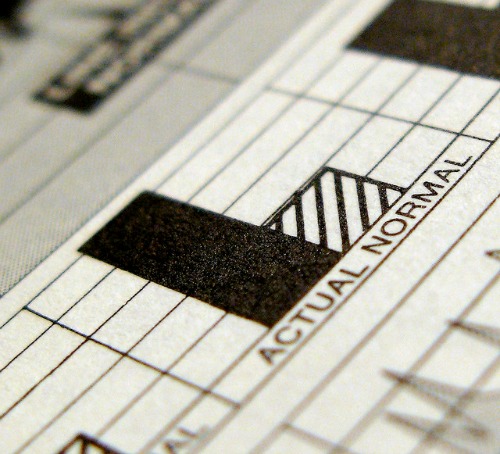
Growing up in Illinois, when I was in elementary school, it was commonplace for our school to have several emergency drills in case there was a tornado. We knew to hide under our desks and cover our heads with our hands and wait until the drill was over. The thought behind the drill was that we would be ready if a disaster ever struck. We followed up with fire drills as well. We prepared for what we knew could happen but hoped would never happen to us… (more…)
Meredith finds it difficult to tell anyone where she is from exactly! She grew up in several states, but mainly Illinois. She has a Bachelor of Science degree in Elementary Education from the University of Illinois at Champaign/Urbana which is also where she met her husband. She taught kindergarten for seven years before she adopted her son from Guatemala and then gave birth to her daughter two years leter. She moved to Lagos, Nigeria with her husband and two children in July 2009 for her husband's work. She and her family moved back to the U.S.this summer(August 2012) and are adjusting to life back in the U.S. You can read more about her life in Lagos and her adjustment to being back on her blog: We Found Happiness.
More Posts

by Purnima Ramakrishnan | Apr 22, 2014 | 2014, Awareness, Brazil, Environment, Human Rights, Humanitarian, Purnima, Social Good, Water, World Moms Blog
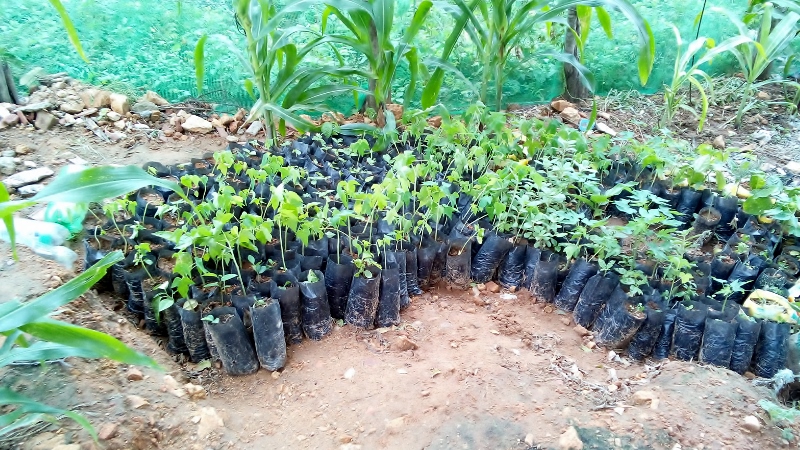
Photo of Celia’s saplings by Purnima Ramakrishnan
“Universal access to water is a right to all and now it is just on our doorsteps” said farmer Celia. I was traveling as a International Reporting Project Fellow, and we had just arrived in the semi-arid city of Cumaru, in the North-Eastern state of Pernambuco.
We had lunch at Joelma’s place who is a farmer in Cumaru. She made delicious rice, palma salad with lots of vegetables in it (a variety of sustainable cacti, native to the lands and which is used to feed both livestock and people). And then we went to her sister-in-law, Celia’s farm. Celia is also a farmer.
When Celia was six years old, she used to go downhill and carry water back up to her home in pots and buckets, and she recalls them being very heavy. When she cajoled her father, he sometimes let her use a donkey to bring it back home. This, the six-year-olds woke up at 3 AM every day to do. I have an 8-year-old at home, and I cannot imagine giving him such a life.
Today though, she is grateful that she can give her own two-year-old, a better life, thanks to the Cisterns project.
The average rainfall in these semi-arid lands varies from 200 to 800 mm, which is very irregular for habitation. Moreover, the amount of evaporation in these lands is three times higher than the rainfall. Hence it becomes even more important to capture the rainwater for families during the dry season. This is the concept of the Cisterns project.
The ASA (Articulation Brazilian Semi-Arid) is a network of social organisations operating in the Northeast of Brazil which aims to “empower civil society to build participatory processes for sustainable development and cope with the semi-arid land based on cultural values, and social justice.”
ASA was born from accumulated experience of organisations and social movements that have worked for years in the perspective of living with the Semi-arid climate. In 1999, the ASA presented a joint project for the Semi-arid to the society and the government, and thus the Articulation became a network.
In 2003, ASA launched P1MC (Program One Million Rural Cisterns), which aims to build 1 million water reservoirs to meet the needs of 5 million families. Currently there are 500 thousand reservoirs and the program has graduated into a public policy adopted by the Federal Budget.
These water reservoirs or cisterns are of two types. Every family has cisterns with a capacity of 16,000 litres of water for domestic use and another of 52,000 litres of water for farming and livestock use. The technology employed here is called social-technology and basically collects water from the rooftops and harvests the rainwater. The families are given a course in water management and are also requested to take a course in farming in semi-arid.
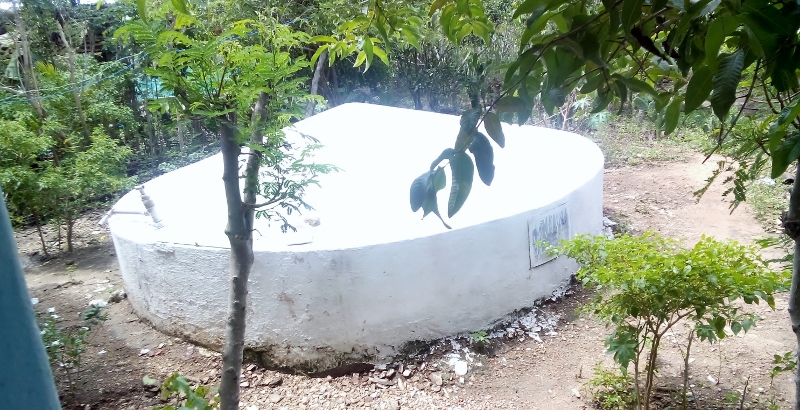
Photo of a 16000 litre cistern by Purnima Ramakrishnan
Celia says, she is now employed and this has brought about female empowerment along with water, and agriculture, all because of the cistern on her doorstep.
She cultivates small saplings and sells it to the other farmers. She grows corn, papaya, oranges, tangerine, beans, cashew, Umbu, tamarind, and many other things. She also sells the produce (though now too much) in the market and to other farmers. Her husband works in construction department in the town, whereas she lives in the village doing her farming with her two-year-old. She hopes to give a better life to her son.
She has been taught in her course to cultivate three types of plants, she says. The first is the native plants which thrives well on the soil of the area with not much dependency, and is more suited to the semi-arid climate like the Umbu. Then the plants which are not suited to the area, like corn, for which abundant water is available from the cisterns. And the third type is the plants for the livestock like Palma. This ensures that the plants give back to nature what they take from it. The soil gets enriched and also nurtures the plants. It is a two-way process.
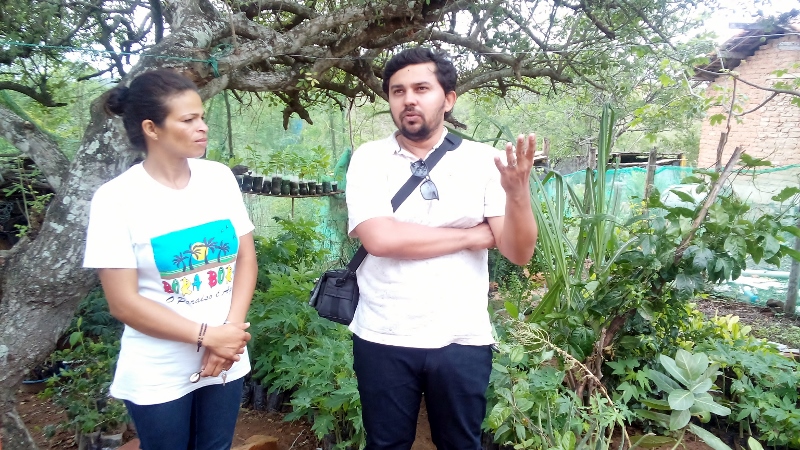
Carlos-explaining-about-the-cisterns-and-farmer-Celia-looking-on Photo by Purnima Ramakrishnan
This seed of change stimulated by social organisations that operate in the region have prompted the development of coexistence of half-barren lands with practical goals absorbed by the government to promote sustainable living.
We asked Carlos, the program coordinator of ASA in the region, “Is this a solution for food security?” He said it is much more than that. It is a solution for independence, female empowerment because of employment in one’s own farm, it is a way to make the semi-arid a much greener place to live, it is a solution to democratize water, and make it a universal right, not a consumer product.
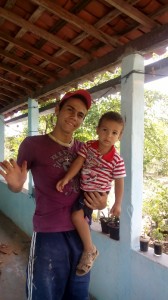
Celia’s son and nephew, Photo by Purnima Ramakrishnan
I remember that water was more expensive than beer in my hotel. And I now knew why! One should not pay to have to drink water, he said.
This concept can be embraced in many developing semi-arid regions.
On this Earth Day, let us pledge to make our cities greener and conserve water. Let us spread such buds of change through social media, and other channels.
How do you plan to honor this Earth Day?
This is a post written by Purnima Ramakrishnan on her #BrazilMDGs trip to Brazil as a fellow of Journalism with the International Reporting Project.

by Olga Mecking | Apr 21, 2014 | 2014, Awareness, Being Thankful, Bilingual, Communication, Family, Health, Humanity, Humor, Kids, Language, Life Balance, Maternal Health, Motherhood, Netherlands, Parenting, Siblings, World Motherhood, Younger Children
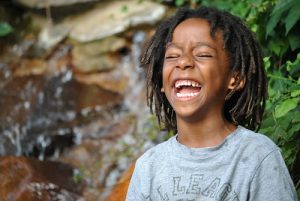 One of my very favourite human qualities is a sense of humour. I must confess that I sometimes find people lacking this wonderful quality, as boring. It isn’t nice of course but I believe a sense of humour is paramount to any human’s well being or even survival. Especially if you’re a mom.
One of my very favourite human qualities is a sense of humour. I must confess that I sometimes find people lacking this wonderful quality, as boring. It isn’t nice of course but I believe a sense of humour is paramount to any human’s well being or even survival. Especially if you’re a mom.
I love all kinds of humour: simple, sophisticated, absurd, or even black humour. By the latter, I mean of course, serious matters that are funny.
When my days are filled with screams and cries and tantrums, the only thing that keeps me afloat is laughing about it. And when I share my pearls of wisdom on Facebook, not only does it make me feel better, it makes others feel better, too. I also love reading snarky, funny, honest posts that make me nod my head in agreement. When times are hard, humour helps me survive.
We all know that parenting is tough and humour can help with that as well. I, for one, rely heavily on it. When my daughter refuses to put on her jacket, I ask her to put on her pj’s. Then her bathing suit. Then her bathrobe. She laughs, says no to all I suggest and puts on her jacket without any problems. That is, obviously provided that I actually remember to laugh instead of to yell.
I often try to persuade my big girl that I have 10 legs. She kindly and patiently explains that no I really can’t have 10 legs. “Why?” I ask her. She tries to explain that humans only have 2 legs but to no avail. I really need to know why I only have 2 legs, not 10. I mean, 2 legs, how lame is that! At some point, she cracks up and so do I and we both laugh until we can’t laugh anymore.
So you see, it is not very surprising that I want my children to have a sense of humour and a big one at that. Puns, laughter and jokes are normal in our house. And already, I begin seeing it in my children. For instance, I loved a recent conversation with my three-year old.
“Mama?”- she asks me, with a glint in her eye, and a smile playing in the corner of her mouth.
“Yes, J?”- I answer, wondering what she’s going to say.
“Mama?”- she repeats, her tone still serious but the smile more visible.
“Yes, J?”- I repeat, not sure what to think of it.
“Pee-Pah-Paw!” she says, out of nowhere, her laughter filling the house. “Pee-pah-paw”- I say, and soon the whole family joins her till our bellies hurt.
My baby has a mischievous smile that makes my heart melt. When he laughs, I think I’m the luckiest mom on Earth. I ‘m sure that he too will grow up to have a sense of humour, just like his sisters.
I especially love when they make multilingual jokes, like “Ja-vocado” and “Nie-vocado” (“ja” is “yes” in German while “nie” means “no” in Polish). When asked what a ja-vocado is, my eldest daughter said that it’s a fruit that is yellow on the outside and pink on the inside and it is sweet and very delicious and that she likes it a lot.Funny that she can imagine liking fruit that doesn’t even exist.
I am always surprised how many functions humour can have: it can help you through tough times. It can turn a rejection into cooperation, in children and adults alike. It makes children clever and great with languages. It makes us see things in a different way.This is why I feel it is so important.
I’m not funny all the time, though and that’s fine. It’s OK to be sad sometimes. I won’t pretend that my day is better than it is. But when I remember, I find in myself the strength to stick my tongue out at the universe and say: “Pee-Pah-Paw”. And laugh until my belly hurts.
Are you raising your kids to have a sense of humour or appreciate humour?
This is an original post to World Moms Blog from our writer in the Netherlands, Olga Mecking.
The image used in this post is credited to cherijoyful. It holds a Flickr Creative Commons attribution license.
Olga is a Polish woman living in the Netherlands with her German husband. She is a multilingual expat mom to three trilingual children (even though, theoretically, only one is trilingual since she's old enough to speak). She loves being an expat, exploring new cultures, learning languages, cooking and raising her children. Occasionally, Olga gives trainings in intercultural communication and works as a translator. Otherwise, you can find her sharing her experiences on her blog, The European Mama. Also take a while to visit her Facebook page .
More Posts - Website
Follow Me:




by Karyn Wills | Apr 14, 2014 | 2014, Awareness, Being Thankful, Brothers, Communication, Family, Kids, Life Lesson, Motherhood, New Zealand, Older Children, Parent Care, Siblings, World Moms Blog, World Motherhood

The author with her three boys
When my boys were small, it was easy to find ways for them to nurture. They all had dolls and stuffed animals to care for and I tried hard to let them hug me whenever they wanted, even when it was really inconvenient or awkward, or snotty, or tiring for me.
But it got harder, when they got older. Dolls gave way to LEGO and cars, then Nerf guns and Minecraft. Time away from me at kindy or school, or play-dates or sport, meant the hugs, while no less enthusiastic, were less frequent. I realised I had to be more lateral in seeing their nurturing: Life had changed and they had grown beyond my initial, pre-baby, plans and ideas.
It came to me in a flash of understanding, a few weeks ago, how much their being in service to me, is their way of nurturing and this is what I now focus on, for this part of their growth and development.
The times when they tell me to sit on the sofa and do nothing, I need to listen to them and do as they wish. And while I have always accepted their offerings of daisies and dandelions picked from the lawn and scrunched in tiny hands, I now have to accept them pouring my wine and cooking my dinner – without my input.
The times they volunteer to do these things, I need to keep my directions to myself and my appreciation flowing – despite my discomfort at sitting still while they work and despite the painful slowness with which they perform these tasks.
I have also learned to accept them opening doors for me. They do this not because they think I can’t manage to do so for myself, but because it’s a way they can show me that they care for me.
And I accept their offerings, not because I think I deserve this gesture because of my gender, or my age, or my position as grand dame in their lives, but because I see it for what it is: Nurturing of me, and something to be valued and encouraged.
Apologies have also become a point of nurturing. In our house, they are seen not as just social niceties and empty words, but as a starting point for repairing a battered emotional bond. After an apology-needing moment they almost always ask, “How can I make things better?” And are wonderful at showing they really do mean their words via their actions. They nurture their relationship with me, as I do with them.
No, they aren’t angel children who do these things all the time. They still need direction and they can be down right horrid. They are often disorganised and they are often messy, noisy and silly. But they do show their ability to nurture in a variety of ways. I just have to look at their actions from a different perspective, and accept their gestures as signs of the loving emotion behind them.
How do your children show you they care?
This is an original post to World Moms Blog from our writer in New Zealand and mother of 3 loving boys, Karyn.
The photograph used in this post is credited to the author.
Karyn is a teacher, writer and solo mother to three sons. She lives in the sunny wine region of Hawke’s Bay, New Zealand in the city of Napier.
More Posts
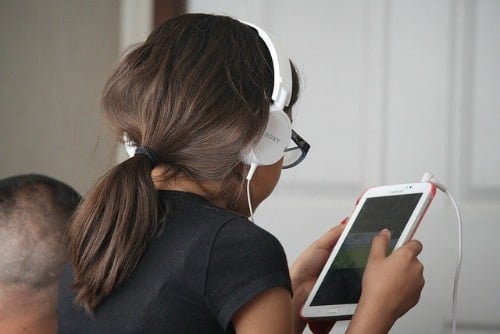
by Nancy Sumari | Apr 2, 2014 | Awareness, Food, Humanity, Nancy Sumari, Parenting, Uncategorized, World Moms Blog

Living in a developing country and being blessed enough to be able to work, provide for your family and get by, is considered lucky.
In Tanzania people are considered poor when their consumption is below than the national poverty line. Consumption includes all goods that are bought, as well as those produced and consumed at home. This includes food, household equipment, clothing, personal effects, personal care, recreation, cleaning, domestic services, contributions, fuel, petrol and soap.
Over the years, I have always had a sense of responsibility and felt the urgency to work towards bridging gaps in poverty, through advocating for education and engaging in activities, big and small, in sectors like health and social change in an attempt to bridge this gap.
After having my daughter, I understand the notion that every parent wants the very best for their child. It does not escape me how truly blessed we have been to be able to provide for her. What I’m struggling with now is excess, conservation as well as teaching her to understand that she really is no different than another young girl from the other side of town who does not have the luxury of being able to enjoy three healthy meals a day and who cannot afford to go to school. I hope to be able to awaken this sense of responsibility towards poverty and the gaps in society in my daughter.
One evening, I came home after a visit to a school in Dodoma, the country’s capital, where I had been working to raise funds for building a girls’ hostel. These students were going through horrors every day; from 16 kilometer walks to and from school, to living in deplorable conditions, to being subject to burglary and rape. It was really weighing in on me.
I walked in to find my younger brother and my daughter watching TV with the sound on really loud. She was playing a game on the iPad and lights were on all around the house. Excess. They had just had dinner and both seemed to be almost just laying there. or me that was a turning point. Things had to change. Scaling down was imminent.
High on our agenda these days is use of only what we need. Above all is practicing gratitude. When she is old enough to understand, I will introduce her to the reality of the way things are in the world.
It really strikes me though, time and time again, just how different lives are. Not to bite the hand that feeds me, but it seems almost unfair that some have so much while others have so little. What makes us special to be the “Haves” and them the “Have Nots”?
My struggle these days is just to try and get it.
What are your thoughts? How do you teach your kids about giving back?
This is an original post by Nancy Sumari from Tanzania. You can find more of her writing at Mama Zuri.
Photo credit to Wheeler Cowperthwaite























